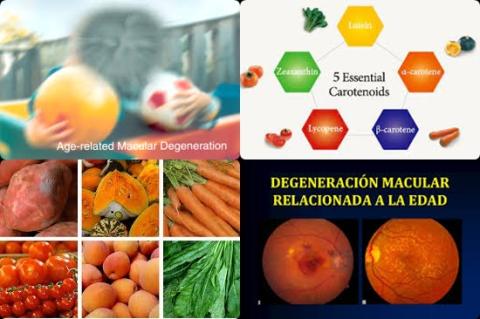
Objectives:
Data from studies support a beneficial effect of carotenoids and vitamins on an age-related macular degeneration (AMD) risk. However, studies on the relations between blood levels of these nutrients and AMD are limited and provided conflicting results. Therefore, this review article has been conducted.
Does a higher concentration of carotenoids (lutein/zeaxanthin, β-carotene, β-cryptoxanthin, lycopene) and vitamins in blood reduce age-related macular degeneration risk?
Study design:
This review article included 9 studies (1 cohort, 4 case-control and 4 cross-sectional studies) involving 15,674 participants and 2,077 AMD cases (persons with age-related macular degeneration).
There was no evidence of publication bias.
Results and conclusions:
The investigators found in the meta-analysis that high blood lutein/zeaxanthin level significantly reduced risk of age-related macular degeneration with 47% [OR = 0.53, 95% CI = 0.40 to 0.72, p 0.001, I2 = 43.3%, p = 0.079], compared to those with low level.
Results stratified by factors yielded similar results to the main analysis.
The investigators found in the meta-analysis that high blood β-carotene level significantly reduced risk of age-related macular degeneration with 52% [OR = 0.48, 95% CI = 0.28 to 0.84, p = 0.01, I2 = 71.7%, p = 0.003], compared to those with low level.
A subgroup analysis by geographic region showed that the significant inverse association between blood β-carotene levels and risk of age-related macular degeneration was only found among the Asians.
The investigators found in the meta-analysis that high blood β-cryptoxanthin level significantly reduced risk of age-related macular degeneration with 52% [OR = 0.48, 95% CI = 0.23 to 1.00, p = 0.04, I2 = 83.5%, p 0.001], compared to those with low level.
In stratified analyses, no significant difference was observed for any subgroups.
The investigators found in the meta-analysis that high blood lycopene level significantly reduced risk of age-related macular degeneration with 30% [OR = 0.70, 95% CI = 0.54 to 0.90, p = 0.006, I2 = 0.0%, p = 0.67], compared to those with low level.
The investigators found in the meta-analysis that high blood α-tocopherol (vitamin E) level significantly reduced risk of age-related macular degeneration with 50% [OR = 0.50, 95% CI = 0.31 to 0.81, p = 0.005, I2 = 34.4%, p = 0.19], compared to those with low level.
The investigators found sensitivity analyses, that excluded one study at a time, did not change the statistical significance or the direction of the present findings, corroborating the robustness of the results.
The investigators concluded that there is a protective effect of higher concentration of carotenoids (lutein/zeaxanthin, β-carotene, β-cryptoxanthin, lycopene) and vitamin E in blood against age-related macular degeneration risk, which provides further evidence of the associations between carotenoid and vitamin status and the risk of age-related eye problems. Further randomized clinical trials are necessary for Asians to confirm such associations and to provide the most reliable direct information to base public health recommendations for age-related eye disease prevention by nutritional supplementation with carotenoids and vitamins.
Original title:
The Associations of Plasma Carotenoids and Vitamins With Risk of Age-Related Macular Degeneration: Results From a Matched Case-Control Study in China and Meta-Analysis by Jiang H, Fan Y, […], Ma L.
Link:
https://www.ncbi.nlm.nih.gov/pmc/articles/PMC8873933/
Additional information of El Mondo:
Find more information/studies on meta-analysis/cohort, carotenoids, vitamin E and elderly right here.
High blood levels of beta-carotene can be obtained by consuming beta-carotene-rich foods and/or taking beta-carotene supplements.